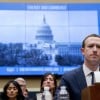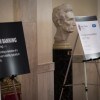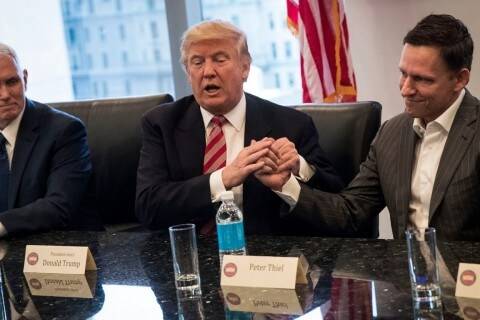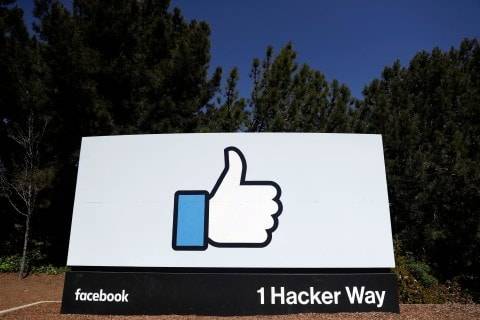Analysis | The Technology 202: Facebook’s political woes aren’t over. But Wall Street is unfazed. – The Washington Post
Ctrl + N

Facebook CEO Mark Zuckerberg pauses while testifying before a House Energy and Commerce hearing on Capitol Hill in Washington.(AP Photo/Andrew Harnik, File)
Facebook isn’t out of the woods just yet.
Yes, the social network reached a settlement with the Federal Trade Commission that ends a broad probe into its privacy practices. But hours after that announcement, Facebook confirmed in its quarterly earnings report that the FTC has opened another formal investigation, this time into antitrust concerns.
The probe is in addition to a broad antitrust review of the tech giants that the Justice Department announced earlier this week, as well as a bipartisan House investigation into tech’s power and impact on competition.
“It looks like the antitrust winter is over,” Columbia University law professor Tim Wu, who chronicled the subject in his book “The Curse of Bigness: Antitrust in the New Gilded Age,” told my colleagues earlier this week.
But Facebook seems likely to prove resilient despite unprecedented political pressure and record-breaking fines.
The company’s stock soared as it posted strong earnings — on the same day it announced the antitrust probe, a historic $5 billion settlement with the FTC with new limitations on its business and a $100 million settlement with the Securities and Exchange Commission.
The stark contrast underscores how Wall Street has been unfazed by Washington’s efforts to rein in the social networking giant. And that’s where the true test might be, analysts told my colleagues Tony Romm and Elizabeth Dwoskin. The company has been able to continue to grow its business, reaching $16.9 billion in revenue last quarter, beating analyst estimates of $16.49 billion, despite the compounding political headaches in Washington.
“It’s a balancing act for Zuckerberg and Facebook to navigate this, because investors want to see growth and profitability,” Daniel Ives, managing director for equity research at Wedbush, told my colleagues.
“But in terms of the stock, Facebook and Zuckerberg have been almost Teflon-like over the last two years,” Ives continued. “And as long as they continue to execute, all the other issues . . . will become background noise.”
The stock’s resilience has stoked fears in Washington that federal regulators are not doing enough to hold the company to account. Congressional Democrats and Sen. Josh Hawley (R-Mo.) both blasted the FTC’s settlement with Facebook yesterday, arguing that it did not place enough limitations on Facebook’s business practices. There are growing concerns that the agency doesn’t have the resources or the will to police tech giants in a meaningful way, even as it becomes more aggressive in opening investigations into these companies.
Hawley told Tony that yesterday’s FTC settlement with Facebook amounted to a “parking ticket” that “will not deter them in any way.”
“I don’t have a lot of confidence in the FTC even if they had an actionable claim,” he said. “They would act push for and show the tenacity and the guts to bring it because frankly they haven’t done it to date.”
The FTC’s antitrust probe of Facebook will be a new test of the agency’s power at a time when some are questioning if it should have oversight over Big Tech.
“It’s not clear to me whether they need more budget, more staff,” Hawley told Tony. “I’m wondering whether we need to reassign their jurisdiction to another agency.”
Some tech policy experts who were disappointed by the FTC’s settlement with Facebook over its privacy practices saw the new antitrust probe as a “silver lining.” Ashkan Soltani, a former FTC chief technologist, said:
BITS, NIBBLES AND BYTES
BITS: Tech companies like Facebook, YouTube and Twitter are outsourcing critical content moderation jobs to the Philippines, where workers are making decisions about whether massacres or suicides should stay online. But with thousands of miles separating them from Silicon Valley, these workers are vulnerable to exploitation by the tech giants, my colleagues Elizabeth Dwoskin, Jeanne Whalen and Regine Cabato write.
In interviews with my colleagues, 14 current and former moderators in the Philippines “described a workplace where nightmares, paranoia and obsessive ruminations were common consequences of the job. Several described seeing colleagues suffer mental breakdowns at their desks. One of them said he attempted suicide as a result of the trauma.”
Lester, a man who worked as a contractor for YouTube and Twitter in Manila, prays every week that God will “white out” the terrible images he’s seen from his memory. “He made decisions about whether a child’s genitals were being touched accidentally or on purpose, or whether a knife slashing someone’s neck depicted a real-life killing — and if such content should be allowed online,” my colleagues write. “He’s still haunted by what he saw. Today, entering a tall building triggers flashbacks to the suicides he reviewed, causing him to entertain the possibility of jumping.”
The technology companies keep workers like Lester at a distance, hiring them through major outsourcing firms rather than directly. Workers in the Philippines told my colleagues that the companies don’t provide enough support to address the psychological toll of the job. They can’t talk to friends about it because of the confidentiality agreements they signed, and they have daily accuracy targets that make it difficult for them to take breaks.
In interviews, the tech companies told my colleagues that they’re still grappling with how to offer psychological support and better workplace conditions for these workers whose jobs were created in a hurry.

Posters advertising the Presidential Social Media Summit in the East Room of the White House on July 11. (Jabin Botsford/The Washington Post)
NIBBLES: A White House summit on social media boosted the followings of the conservative figures who attended to share stories about being censored, my colleague Drew Harwell reports. Fifteen of the event’s invitees saw their Twitter audiences grow by a combined 197,000 followers — a 75 percent jump over the number of followers they gained in the same period before the event, according to a Washington Post analysis.
Drew found that the 15 accounts tweeted more than 6,000 times in the two weeks since — often echoing the claims of their host, President Trump. They posted tweets calling former special counsel Robert S. Mueller III a “senile” “leftist” leading a “hit-job” as he went in front of Congress and spread meme after meme against him.
Some experts told Drew that the summit proved to be opposite of what was advertised. Rather than “censoring” conservatives, fringe actors have used claims of bias to launch their own star power. With Republicans on Capitol Hill leading the way — they hosted another hearing on anti-conservative bias just last week — conservative stars remain convinced of their oppression.
“While I might be able to reach a few hundred thousand with suppression, I could reach millions without it,” David J. Harris Jr., a black conservative author who attended the summit, told Drew. “Who knows how far it could grow?”

A Stanford University student walks in front of Hoover Tower on campus in Palo Alto, Calif. (Paul Sakuma/AP)
BYTES: With a new $5 million gift from Craig Newmark Philanthropies, the Internet Observatory hopes to give researchers new tools to study the influence of social media on areas including public health, terrorist content and disinformation with a cross-disciplinary academic research.
“If you’re an astronomer here at Stanford, you don’t have to go raise $5 billion to launch your own Hubble Space Telescope. You go rent time on existing systems that can be used for scientific study,” said Alex Stamos, the project’s director. “We want to build that telescope to peer into the Internet. You can come and partner with us to do that work without having to get your own graduate students that write Python or without having to sign data-access agreements with the companies.”
Among the Internet Observatory’s first policy goals is to deliver recommendations on how to jointly protect the 2020 U.S. presidential election to Congress and the major technology firms. The team has already made dozens of recommendations to Congress and is focusing now on diving into areas where members have expressed interest, including advertising disclosure, and building a consortium between companies to share data. This includes lending advice to legislative efforts, such as the one by Rep. Ro Khanna (D-Calif.) to encourage tech companies to share disinformation data with one another — and hopefully researchers.
Funder Craig Newmark, who has put more than $100 million into journalism and information security projects since 2016, said academics are an important part of shoring up defenses against foreign and domestic interference in 2020.
“The best analysts aren’t at government, they aren’t at platforms — they’re working at different parts of information warfare sector. They’re individual researchers,” said Newmark. “This is all hands on deck.”
PUBLIC CLOUD

Treasury Secretary Steven Mnuchin leaves after speaking to members of the news media Wednesday at the White House. (Pablo Martinez Monsivais/AP)
— Treasury Secretary Steven Mnuchin on Wednesday praised the Justice Department’s decision to launch a wide-reaching antitrust review of the tech industry. In a CNBC interview, Mnuchin expressed approval that the probe could target e-commerce giant Amazon.
“I think if you look at Amazon, although there are certain benefits to it, they’ve destroyed the retail industry across the United States, so there’s no question they’ve limited competition,” Mnuchin said. “There’s areas where [Amazon] really hurt small businesses.”
The Justice Department probe will broadly investigate how major tech companies may have “reduced competition, stifled innovation or otherwise harmed consumers.” While the agency did not name specific companies, Amazon, which is also facing an anti-competition probe in Europe, is a possible target.
President Trump has lashed out at Amazon, Google and Facebook since he announced his administration was looking into potential antitrust violations by tech companies late last year. Amazon founder and chief executive Jeff Bezos owns The Washington Post.
— The lobbying group representing Uber is throwing its weight against federal legislation that could prove to be another wrench in the company’s fight to keep its workers classified as contractors. TechNet sent a letter to the House Education and Labor Committee ahead of today’s hearing on “Protecting the Right to Organize Act,” a bill that would modernize America’s labor laws. In a letter shared with Technology 202, the group claims that “a definitional test of what constitutes an employee as opposed to an independent contractor … could have a chilling effect on the ‘on-demand’ or ‘gig’ economy.” The group advocated for an industry exemption similar to the one it has been trying to negotiate in California, where legislation that could classify Uber and Lyft drivers as full-time employees is close to passing.
— More news from the public sector:
House passes anti-robocall bill
The House on Wednesday took a major step toward cracking down on illegal robocalls by passing legislation allowing for tougher penalties against the scammers who generate billions of unwanted calls each year.&
The Hill
Trump Admin Disses Peter Thiel, Sides With Google Over Treason Claim
Treasury Secretary Steven Mnuchin and President Trump spoke to Google’s CEO directly about the weighty accusation.
The Daily Beast
U.S. Poised to Approve Merger of T-Mobile, Sprint
The Justice Department is poised to approve T-Mobile US’s merger with Sprint under a divestiture plan that would equip satellite-TV operator Dish Network with the building blocks for a new wireless network.
Wall Street Journal
PRIVATE CLOUD
— News from the private sector:
Technology
How Facebook is trying to stop its own algorithms from doing their job
Facebook is launching a set of new tools to combat the spread of harmful content and misinformation across its family of apps, including Instagram and Facebook Messenger.
Elizabeth Dwoskin
Technology
Tesla loss shows perils of lower-priced Model 3
The electric car maker delivered a record 95,200 vehicles in the second quarter.
Faiz Siddiqui
DoorDash to Change Pay Model For Delivery Workers After Criticism
DoorDash plans to change its compensation structure for delivery workers after facing criticism for applying customer tips toward workers’ guaranteed minimum payments.
Wall Street Journal
#TRENDING
— Tech news generating buzz around the Web:
They said you could leave electric scooters anywhere — then the repo men struck back
Bird and Lime are suing a team of repo men for confiscating their scooters.
The Verge
The Scheduling Woes of Adult Friendship
To avoid the dreaded back-and-forth of coordinating hangouts, some friends are repurposing the shared digital calendar, a workplace staple, to plan their personal lives.
The Atlantic
@MENTIONS
— Talent news at the intersection of the tech industry and Washington
- Facebook will be moving Michel Protti, the vice president of product marketing on partnerships, to a new role as chief privacy officer pending board approval, Adweek reports.
- Arianna Huffington, founder of Thrive Global, stepped down from Uber’s board of directors. Matt Cohler, general partner at Benchmark, also announced he would step down from Uber’s board.
- JB Straubel, chief technology officer at Tesla, is stepping down after 15 years, according to an announcement from chief executive Elon Musk.
CHECK-INS
Today:
- The House Financial Services Committee will host a hearing examining the use of alternative data in credit scoring to expand access to credit on at 10 a.m. Thursday.
- The House Health, Employment, Labor and Pensions Subcommittee will host a hearing on “Protecting the Right to Organize Act: Modernizing America’s Labor Laws” at 10:15 a.m.














